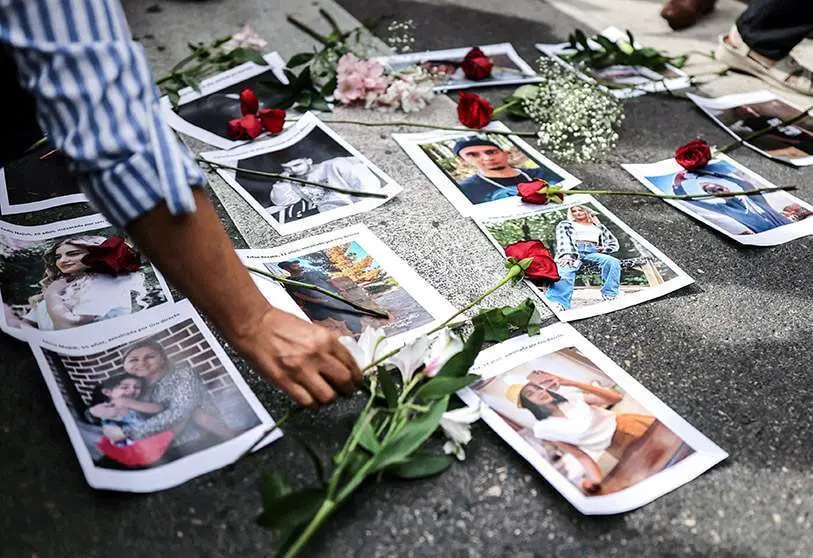"Mujer, vida, libertad": Iranians in Madrid demonstrate against dictatorship

The protests that began in Iran last September following the death of young Kurdish woman Mahsa Amini at the hands of the morality police have crossed borders. Iranians abroad are demonstrating in their countries of residence, expressing their full support for their compatriots and calling for an end to the Ayatollahs' regime.
The Iranian community in Madrid has also taken to the streets to show its support and call on the Spanish government to react to the flagrant human rights violations being carried out by the regime in Tehran. Iranians in Madrid, as well as Spanish citizens, have gathered in the Plaza de Cibeles under the slogan "woman, life, freedom", one of the symbols of the protests.
In both Persian and Spanish, participants called for an end to the "Islamist and terrorist regime" in the Islamic Republic of Iran and conveyed their support for the women and youth of Iran. They also stressed that the reason for the struggle was "equality" and "dignity". As has been the case in Iran and other countries, the demonstrators remembered Mahsa Amini and the others killed during the protests. According to the latest figures from Iran Human Rights, at least 277 have been killed during the protests, including 40 minors. "No to dictatorship, down with the ayatollahs", chanted the Iranians in Madrid.

"This demonstration serves to show that we detest backward thinking, we want to move towards something better, towards equality and dignity to create a fairer society in line with the standards that are acceptable today," said Moshen Vahedi Eyvazi, one of the Iranians who attended the event.
As for what Western society, particularly European society, can do about the protests, Moshen explains that it should "recognise that a large part of the people of Iran, especially the youth, want to live and participate in an environment that allows them to progress".
In addition to the chants against the ayatollahs and the Basiji forces - a paramilitary force under the Islamic Revolutionary Guard that is playing a key role in confronting the protesters - during the almost two-hour demonstration, the protesters were also able to chant against the Islamic Revolutionary Guard, during the almost two-hour demonstration there was also space for Iranian and Kurdish songs, such as "come to the battlefield", recently sung by famous singers like the Kurdish Naser Razazi, Shahin Najafi or Ebrahim Hamedi -known as Ebi-, as Moshen points out.
The meeting also remembered Santiago Sánchez, the Spaniard who disappeared in Iran while travelling on foot to watch the World Cup in Qatar. According to Hengaw, Sánchez was detained by Iranian security forces after visiting Amini's grave in Saqqez, the young woman's hometown. The Spaniard was arrested along with an Iranian national, Bandar Abbas, his translator, and is being held at the Iranian intelligence detention centre in Sanandaj.

The protesters also directly addressed the Spanish government, calling for stronger measures against the Iranian regime. Recently, on the occasion of the attack on the Shah Cheragh Mausoleum in Shiraz, La Moncloa reiterated "its full solidarity with Iran in the fight against terrorism". In this sense, under shouts of "shame", the participants reminded Pedro Sánchez's government of the terrorist acts committed by the Iranian regime against its own people.

Since the protests began, Iranians have called for greater involvement of world political leaders. They call on them to openly condemn the actions of the Iranian authorities and to impose firm measures against the Islamic Republic of Iran. In this regard, Canadian President Justin Trudeau has been one of the few presidents who has shown his full support for the protesters, rejecting and criticising the violent repression by the Iranian government, which he called a "barbaric regime" and accused of "committing murder and provoking terror".

Ottawa has banned 10,000 Iranian officials, including members of the Revolutionary Guard, from entering the country "forever". As Trudeau pointed out, "this is a measure that has only been used in the most serious circumstances against regimes that commit war crimes or genocide, such as in Bosnia and Rwanda". The Canadian president has also "demanded accountability" from Tehran, while Vice-President Chrystia Freeland described the Iranian regime as "repressive, theocratic and misogynistic".








